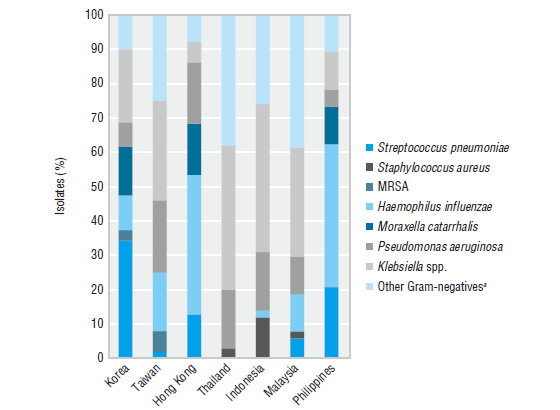Optimal Management of RTI – Intriguing New Results in ABECOPD in Asia
Question 17
What regional differences were noted?
When the prevalence was assessed according to country, marked differences were identified. While the traditional triad of S. pneumoniae, H. influenzae and M. catarrhalis were the most predominant pathogens isolated in Korea, Hong Kong, and the Philippines, this was in stark contrast to results from Malaysia, Taiwan and Indonesia where S. pneumoniae was much less prevalent and Gram-negative pathogens were the predominant cause of ABECOPD (Figure 1). Further analysis of the results revealed that 34% of ABECOPD isolates were S. pneumoniae in Korea, 21% in the Philippines and 13% in Hong Kong, with this dropping dramatically to only 6% in Malaysia, 2% in Taiwan and 0% in Thailand and Indonesia. However, P. aeruginosa rates were much higher in Taiwan, Hong Kong, Thailand and Indonesia (21%, 18%, 17% and 17%, respectively) compared with Korea and the Philippines (7% and 5%, respectively) (Table 3).
The incidence of M. catarrhalis among ABECOPD isolates also varied markedly over the Asia-Pacific region, with 0% being identified in Malaysia, Taiwan, Thailand and Indonesia but 14% in Korea, 15% in Hong Kong and 11% in the Philippines.
Another major difference was the prevalence of Klebsiella spp., which was reported in only 6% of Hong Kong isolates, 11% in the Philippines and 21% in Korea. In contrast, Klebsiella spp. was identified in 43% of Indonesian ABECOPD isolates.
Figure 1. Pathogens responsible for ABECOPD in seven Asian countries

a Includes Enterobacter spp., Acinetobacter baumannii, Escherichia coli, Serratia spp., Stenotrophomonas
maltophilia, Proteus spp., Pseudomonas spp., Acinetobacter spp., Citrobacter spp.,
Pantoea spp., Alcaligenes xylosoxidans, Kluyvera spp., Chryseobacterium meningosepticum.
| Abbreviations: | ABECOPD = acute bacterial exacerbations of chronic obstructive pulmonary disease, MRSA = methicillin-resistant Staphylococcus aureus. |
Adapted from reference (16).
Table 3. Number with percentage of individual ABECOPD isolates reported in seven Asian countries
| Organism | Country
|
||||||||||
| Korea | Taiwan | Hong Kong | Thailand | Indonesia | Malaysia | Philippines | |||||
| S. pneumoniae | 10 (34%) | 1 (2%) | 13 (13%) | 0 (0%) | 0 (0%) | 4 (6%) | 4 (21%) | ||||
| S. aureus | 0 (0%) | 0 (0%) | 0 (0%) | 2 (3%) | 7 (12%) | 1 (2%) | 0 (0%) | ||||
| MRSA | 1 (3%) | 4 (6%) | 0 (0%) | 0 (0%) | 0 (0%) | 0 (0%) | 0 (0%) | ||||
| H. influenzae | 3 (10%) | 11 (17%) | 41 (41%) | 0 (0%) | 1 (2%) | 7 (11%) | 8 (42%) | ||||
| M. catarrhalis | 4 (14%) | 0 (0%) | 15 (15%) | 0 (0%) | 0 (0%) | 0 (0%) | 2 (11%) | ||||
| P. aeruginosa | 2 (7%) | 13 (21%) | 18 (18%) | 12 (17%) | 10 (17%) | 7 (11%) | 1 (5%) | ||||
| Klebsiella spp. | 6 (21%) | 18 (29%) | 6 (6%) | 30 (42%) | 25 (43%) | 21 (32%) | 2 (11%) | ||||
| Other Gram-negativesa | 3 (10%) | 16 (25%) | 8 (8%) | 27 (38%) | 15 (26%) | 26 (39%) | 2 (11%) | ||||
| Total | 29 (100%) | 63 (100%) | 101 (100%) | 71 (100%) | 58 (100%) | 66 (100%) | 19 (100%) | ||||
Adapted from reference (16). |
|||||||||||









